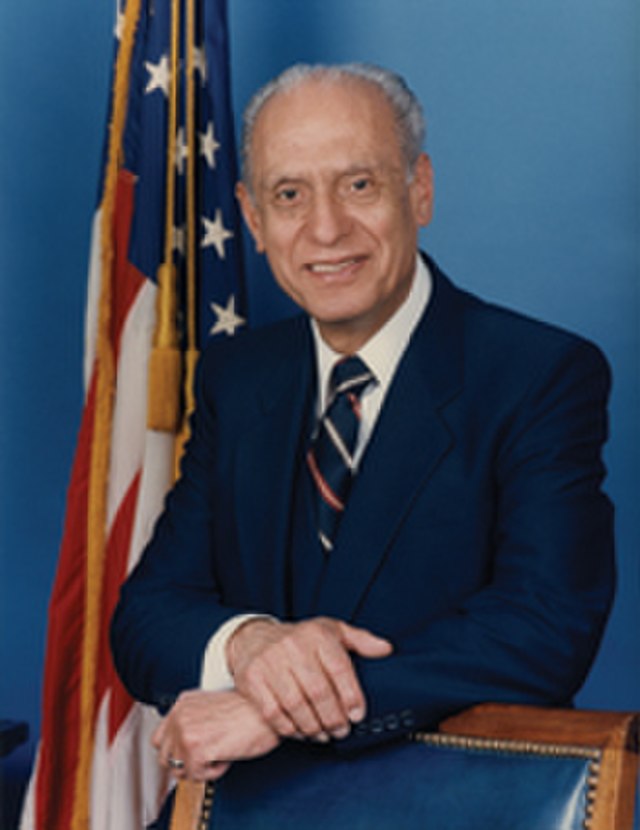- 14 3402-5578
- Rua Hygino Muzy Filho, 737, MARÍLIA - SP
- contato@latinoobservatory.org
 commons.wikimedia.org
commons.wikimedia.org
Edward Ross Roybal (February 10, 1916 – October 24, 2005) was a member of the Los Angeles City Council for thirteen years and of the U.S. House of Representatives for thirty years.
Roybal was born on February 10, 1916, into a Mexican family that traced its roots in Albuquerque, New Mexico back hundreds of years, to the Roybals who settled the area before the founding of Santa Fe. In 1922, a railroad strike prevented his father from being able to work, and Roybal, age 6, was brought with his family to the East Los Angeles neighborhood of Boyle Heights. He attended the local public schools and graduated from Roosevelt High School in 1934. For much of the next year, he worked for the Civilian Conservation Corps before studying accounting and business administration at the University of California, Los Angeles, and Southwestern University, also in the city. From 1942 until 1944 he worked as a public-health educator with the California Tuberculosis Association, and he later served four years as director of health education for the Los Angeles County Tuberculosis and Health Association. Late in the Second World War, Roybal served as an accountant for an infantry unit in the U.S. Army. He married the former Lucille Beserra on September 27, 1940, and the couple raised three children: Lucille; Lillian; and Edward, Jr.
Like many veterans, particularly Latino veterans, Roybal was motivated by his wartime experience to challenge discrimination in Southern California, especially its effects on economic, education, and housing conditions around Los Angeles. After an unsuccessful bid in 1947 for a seat on the Los Angeles city council, Roybal helped start the Community Service Organization (CSO), which sought to ally the city’s diverse neighborhoods, using strategies outlined by noted reformer Saul Alinsky. Roybal was the group’s first president and its primary spokesman, and in addition to pushing an array of progressive issues, the CSO quickly became the core of Roybal’s political base.5 Two years later, at Alinsky’s urging, and with the support of local labor unions and, eventually, several newspapers, Roybal mounted a second attempt for a city council seat.
In 1949, backed by this broad coalition, Roybal won the election, becoming the first Hispanic to serve on the Los Angeles city council since 1881 and one of the highest-ranking Latinos in California municipal government.6 Roybal’s sweeping civil rights agenda, along with his diverse campaign staff and his drive to register voters, contributed to his decisive victory against incumbent Parley P. Christensen. Roybal won the general election with 63 percent of the vote, and despite redistricting and shifts in population over the next decade, he went on to win re-election by huge margins in 1951, 1953, 1957, and 1961.
During his time in the City Council, Roybal, as a prominent young Democrat, received encouragement to run for higher office. In 1954, he ran for lieutenant governor, losing to Republican incumbent Harold J. Powers, who had been appointed to the position after Lieutenant Governor Goodwin Knight acceded to the governorship after Earl Warren was named Chief Justice of the United States, by 1,764,035 votes (44.66%) to 2,185,918 (55.34%).
Running in 1958 against Ernest E. Debs for a seat on the Los Angeles County Board of Supervisors, Roybal lost a bitterly contested election in which he held a slim lead on election night, but lost after four recounts gave the election to Debs.
Despite this, Roybal ran for Congress in 1962, winning election in the 25th District, an area that included his native Boyle Heights, the larger East Los Angeles area, Downtown, and parts of Hollywood. Beginning his term in 1963, he became the first Latino Congressperson from California since the 1879 election of Romualdo Pacheco.
As Congressman, Roybal was generally known for a low-key legislative style. In his first term, he served on the Interior and Insular Affairs Committee and the Post Office Committee. In his next term, he served on the Foreign Affairs Committee and on the Veteran's Affairs Committee.
Representative Edward R. Roybal sponsored “Hispanic Heritage Week,” later changed to “Hispanic Heritage Month,” established by legislation and signed into law by President Lyndon Johnson in 1968.
Beginning in 1971, he served on the House Appropriations Committee for more than two decades and authored a number of bills, many of which were not universally popular, which offered support for groups he saw as disenfranchised; many of his actions were on behalf of veterans, the elderly, and Mexican-Americans. In 1967 he wrote the first bill giving federal support to bilingual education, creating specialized language instruction for immigrant populations. As Chairman of the House Select Committee on Aging, he led a successful campaign to restore $15 million in funding the low-cost health programs for senior citizens and an expanded public housing program for seniors. In 1982 he worked to preserve the Meals on Wheels program and veterans' preferences in hiring. In the early 1980s, against the wishes of many of his own constituents, he argued for expanded funding for AIDS research.
In 1976 he became a founder of the Congressional Hispanic Caucus (CHC) and later co-founded the National Association of Latino Elected and Appointed Officials. In 1986, as chair of the Congressional Hispanic Caucus, he led the unsuccessful opposition to the Simpson-Mazzoli Act.
On January 8, 2001, he was presented with the Presidential Citizens Medal by President Bill Clinton.
He was awarded a posthumous Presidential Medal of Freedom by President Barack Obama on November 24, 2014.
Roybal died of respiratory failure complicated by pneumonia at the age of 89 on October 24, 2005, at Huntington Hospital in Pasadena. He was survived by his wife, Lucille, and children Lucille Roybal-Allard, Lillian Roybal-Rose and Edward Roybal Jr. A funeral service was held at the Cathedral of Our Lady of the Angels, and burial was at Calvary Cemetery, East Los Angeles.
Sources: history.house.gov











